Organisational Behaviour at Waitrose: A Comprehensive Report
VerifiedAdded on 2020/10/23
|17
|5004
|219
Report
AI Summary
This report provides a comprehensive analysis of organisational behaviour within Waitrose, a British supermarket chain. It explores the influence of culture, politics, and power, utilizing Handy's typology and French and Raven's theory to assess their impact on employee behaviour and decision-making. The report examines how Waitrose motivates individuals and teams to achieve organisational goals, delving into content theories like Maslow's hierarchy of needs and process theories such as Vroom's expectancy theory. It also discusses the importance of effective teamwork and the application of these theories to Waitrose's operational environment, including the role culture and power play in its organisational structure and employee relations. The report highlights the importance of factors like personal, decisional, structural, and organisational factors which are affecting Waitrose. This report will cover a theory which is path goal theory and Philosophies will be explained in report. The report concludes with a summary of the key findings and their implications for Waitrose's management practices.
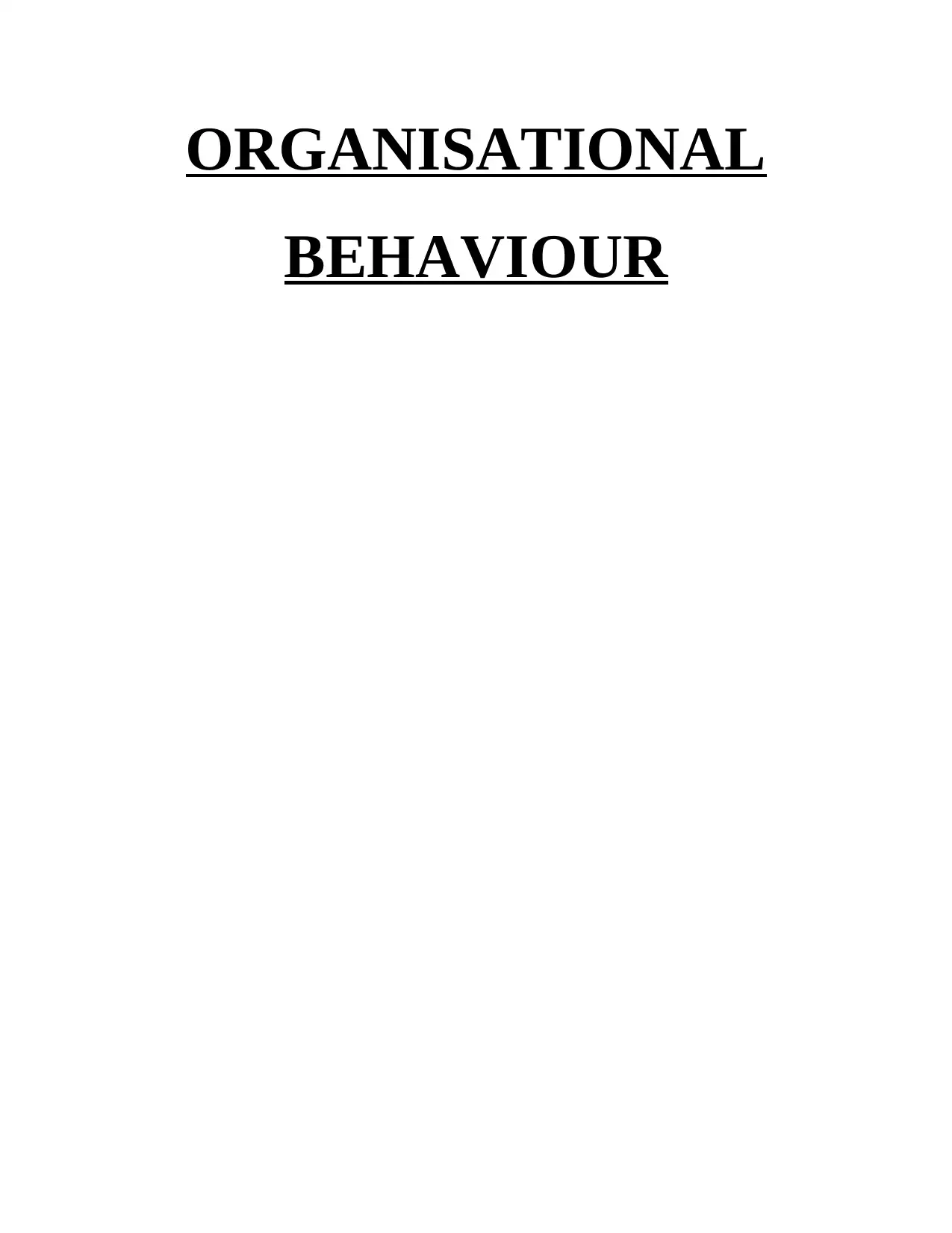
ORGANISATIONAL
BEHAVIOUR
BEHAVIOUR
Paraphrase This Document
Need a fresh take? Get an instant paraphrase of this document with our AI Paraphraser
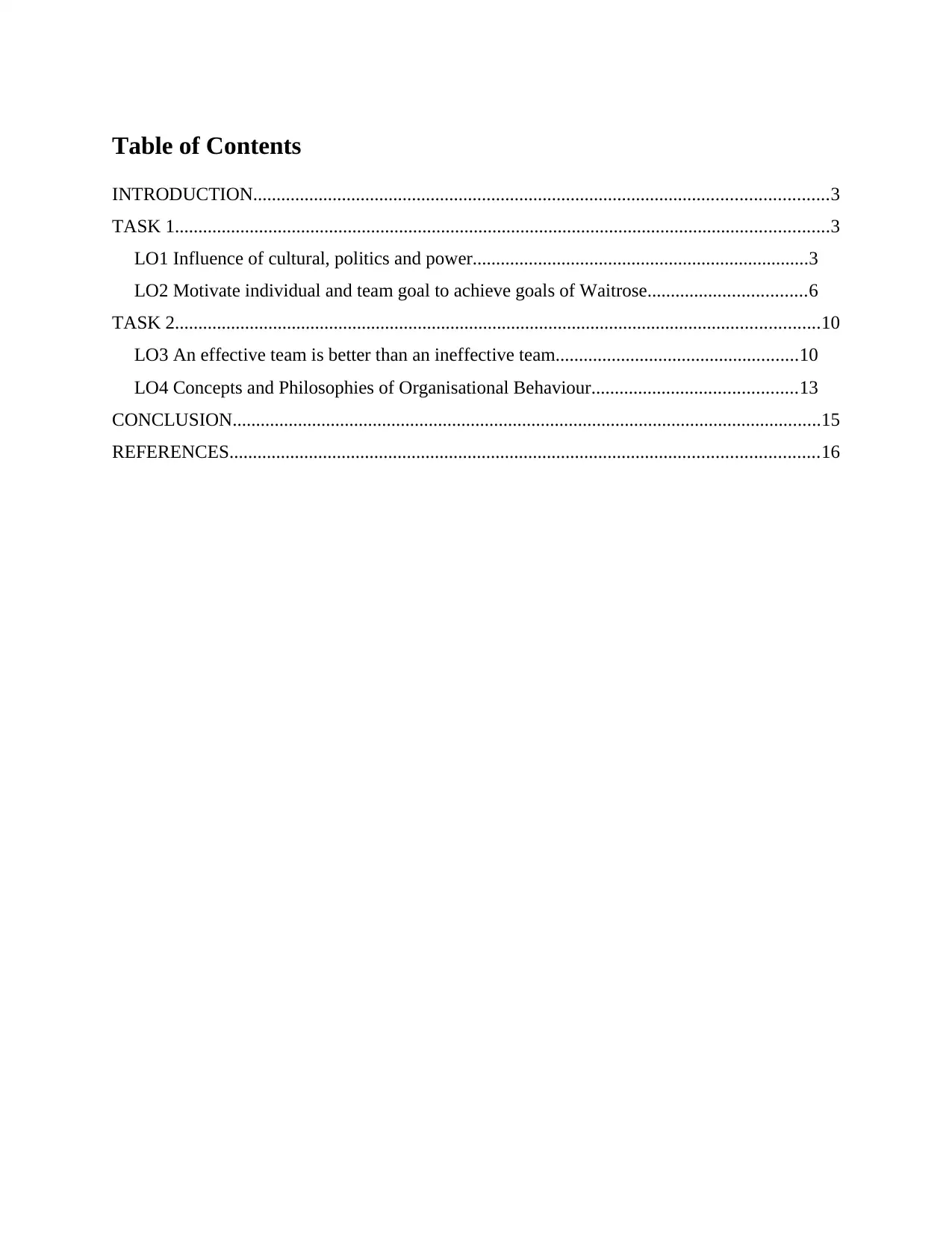
Table of Contents
INTRODUCTION...........................................................................................................................3
TASK 1............................................................................................................................................3
LO1 Influence of cultural, politics and power........................................................................3
LO2 Motivate individual and team goal to achieve goals of Waitrose..................................6
TASK 2..........................................................................................................................................10
LO3 An effective team is better than an ineffective team....................................................10
LO4 Concepts and Philosophies of Organisational Behaviour............................................13
CONCLUSION..............................................................................................................................15
REFERENCES..............................................................................................................................16
INTRODUCTION...........................................................................................................................3
TASK 1............................................................................................................................................3
LO1 Influence of cultural, politics and power........................................................................3
LO2 Motivate individual and team goal to achieve goals of Waitrose..................................6
TASK 2..........................................................................................................................................10
LO3 An effective team is better than an ineffective team....................................................10
LO4 Concepts and Philosophies of Organisational Behaviour............................................13
CONCLUSION..............................................................................................................................15
REFERENCES..............................................................................................................................16
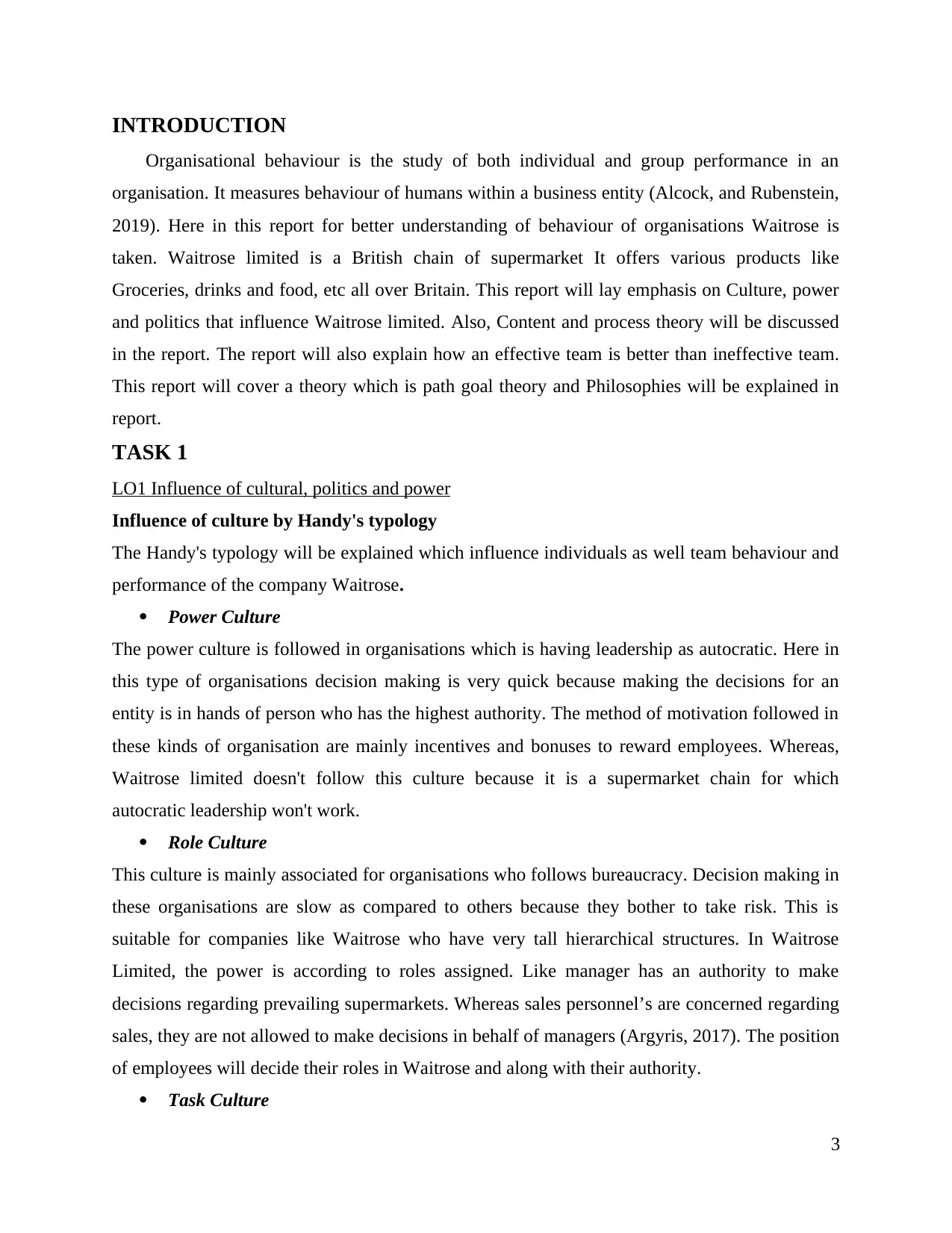
INTRODUCTION
Organisational behaviour is the study of both individual and group performance in an
organisation. It measures behaviour of humans within a business entity (Alcock, and Rubenstein,
2019). Here in this report for better understanding of behaviour of organisations Waitrose is
taken. Waitrose limited is a British chain of supermarket It offers various products like
Groceries, drinks and food, etc all over Britain. This report will lay emphasis on Culture, power
and politics that influence Waitrose limited. Also, Content and process theory will be discussed
in the report. The report will also explain how an effective team is better than ineffective team.
This report will cover a theory which is path goal theory and Philosophies will be explained in
report.
TASK 1
LO1 Influence of cultural, politics and power
Influence of culture by Handy's typology
The Handy's typology will be explained which influence individuals as well team behaviour and
performance of the company Waitrose.
Power Culture
The power culture is followed in organisations which is having leadership as autocratic. Here in
this type of organisations decision making is very quick because making the decisions for an
entity is in hands of person who has the highest authority. The method of motivation followed in
these kinds of organisation are mainly incentives and bonuses to reward employees. Whereas,
Waitrose limited doesn't follow this culture because it is a supermarket chain for which
autocratic leadership won't work.
Role Culture
This culture is mainly associated for organisations who follows bureaucracy. Decision making in
these organisations are slow as compared to others because they bother to take risk. This is
suitable for companies like Waitrose who have very tall hierarchical structures. In Waitrose
Limited, the power is according to roles assigned. Like manager has an authority to make
decisions regarding prevailing supermarkets. Whereas sales personnel’s are concerned regarding
sales, they are not allowed to make decisions in behalf of managers (Argyris, 2017). The position
of employees will decide their roles in Waitrose and along with their authority.
Task Culture
3
Organisational behaviour is the study of both individual and group performance in an
organisation. It measures behaviour of humans within a business entity (Alcock, and Rubenstein,
2019). Here in this report for better understanding of behaviour of organisations Waitrose is
taken. Waitrose limited is a British chain of supermarket It offers various products like
Groceries, drinks and food, etc all over Britain. This report will lay emphasis on Culture, power
and politics that influence Waitrose limited. Also, Content and process theory will be discussed
in the report. The report will also explain how an effective team is better than ineffective team.
This report will cover a theory which is path goal theory and Philosophies will be explained in
report.
TASK 1
LO1 Influence of cultural, politics and power
Influence of culture by Handy's typology
The Handy's typology will be explained which influence individuals as well team behaviour and
performance of the company Waitrose.
Power Culture
The power culture is followed in organisations which is having leadership as autocratic. Here in
this type of organisations decision making is very quick because making the decisions for an
entity is in hands of person who has the highest authority. The method of motivation followed in
these kinds of organisation are mainly incentives and bonuses to reward employees. Whereas,
Waitrose limited doesn't follow this culture because it is a supermarket chain for which
autocratic leadership won't work.
Role Culture
This culture is mainly associated for organisations who follows bureaucracy. Decision making in
these organisations are slow as compared to others because they bother to take risk. This is
suitable for companies like Waitrose who have very tall hierarchical structures. In Waitrose
Limited, the power is according to roles assigned. Like manager has an authority to make
decisions regarding prevailing supermarkets. Whereas sales personnel’s are concerned regarding
sales, they are not allowed to make decisions in behalf of managers (Argyris, 2017). The position
of employees will decide their roles in Waitrose and along with their authority.
Task Culture
3
⊘ This is a preview!⊘
Do you want full access?
Subscribe today to unlock all pages.

Trusted by 1+ million students worldwide
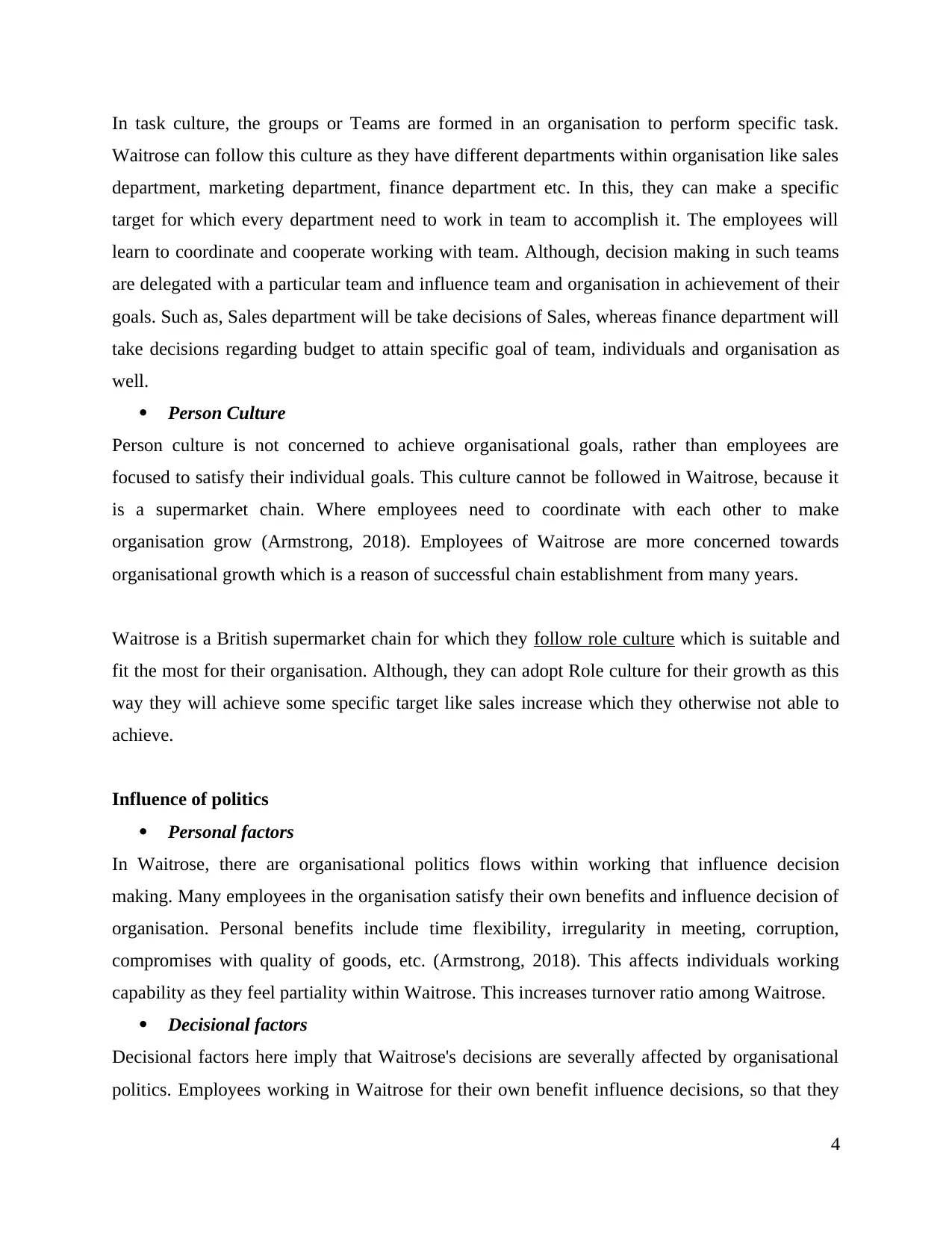
In task culture, the groups or Teams are formed in an organisation to perform specific task.
Waitrose can follow this culture as they have different departments within organisation like sales
department, marketing department, finance department etc. In this, they can make a specific
target for which every department need to work in team to accomplish it. The employees will
learn to coordinate and cooperate working with team. Although, decision making in such teams
are delegated with a particular team and influence team and organisation in achievement of their
goals. Such as, Sales department will be take decisions of Sales, whereas finance department will
take decisions regarding budget to attain specific goal of team, individuals and organisation as
well.
Person Culture
Person culture is not concerned to achieve organisational goals, rather than employees are
focused to satisfy their individual goals. This culture cannot be followed in Waitrose, because it
is a supermarket chain. Where employees need to coordinate with each other to make
organisation grow (Armstrong, 2018). Employees of Waitrose are more concerned towards
organisational growth which is a reason of successful chain establishment from many years.
Waitrose is a British supermarket chain for which they follow role culture which is suitable and
fit the most for their organisation. Although, they can adopt Role culture for their growth as this
way they will achieve some specific target like sales increase which they otherwise not able to
achieve.
Influence of politics
Personal factors
In Waitrose, there are organisational politics flows within working that influence decision
making. Many employees in the organisation satisfy their own benefits and influence decision of
organisation. Personal benefits include time flexibility, irregularity in meeting, corruption,
compromises with quality of goods, etc. (Armstrong, 2018). This affects individuals working
capability as they feel partiality within Waitrose. This increases turnover ratio among Waitrose.
Decisional factors
Decisional factors here imply that Waitrose's decisions are severally affected by organisational
politics. Employees working in Waitrose for their own benefit influence decisions, so that they
4
Waitrose can follow this culture as they have different departments within organisation like sales
department, marketing department, finance department etc. In this, they can make a specific
target for which every department need to work in team to accomplish it. The employees will
learn to coordinate and cooperate working with team. Although, decision making in such teams
are delegated with a particular team and influence team and organisation in achievement of their
goals. Such as, Sales department will be take decisions of Sales, whereas finance department will
take decisions regarding budget to attain specific goal of team, individuals and organisation as
well.
Person Culture
Person culture is not concerned to achieve organisational goals, rather than employees are
focused to satisfy their individual goals. This culture cannot be followed in Waitrose, because it
is a supermarket chain. Where employees need to coordinate with each other to make
organisation grow (Armstrong, 2018). Employees of Waitrose are more concerned towards
organisational growth which is a reason of successful chain establishment from many years.
Waitrose is a British supermarket chain for which they follow role culture which is suitable and
fit the most for their organisation. Although, they can adopt Role culture for their growth as this
way they will achieve some specific target like sales increase which they otherwise not able to
achieve.
Influence of politics
Personal factors
In Waitrose, there are organisational politics flows within working that influence decision
making. Many employees in the organisation satisfy their own benefits and influence decision of
organisation. Personal benefits include time flexibility, irregularity in meeting, corruption,
compromises with quality of goods, etc. (Armstrong, 2018). This affects individuals working
capability as they feel partiality within Waitrose. This increases turnover ratio among Waitrose.
Decisional factors
Decisional factors here imply that Waitrose's decisions are severally affected by organisational
politics. Employees working in Waitrose for their own benefit influence decisions, so that they
4
Paraphrase This Document
Need a fresh take? Get an instant paraphrase of this document with our AI Paraphraser
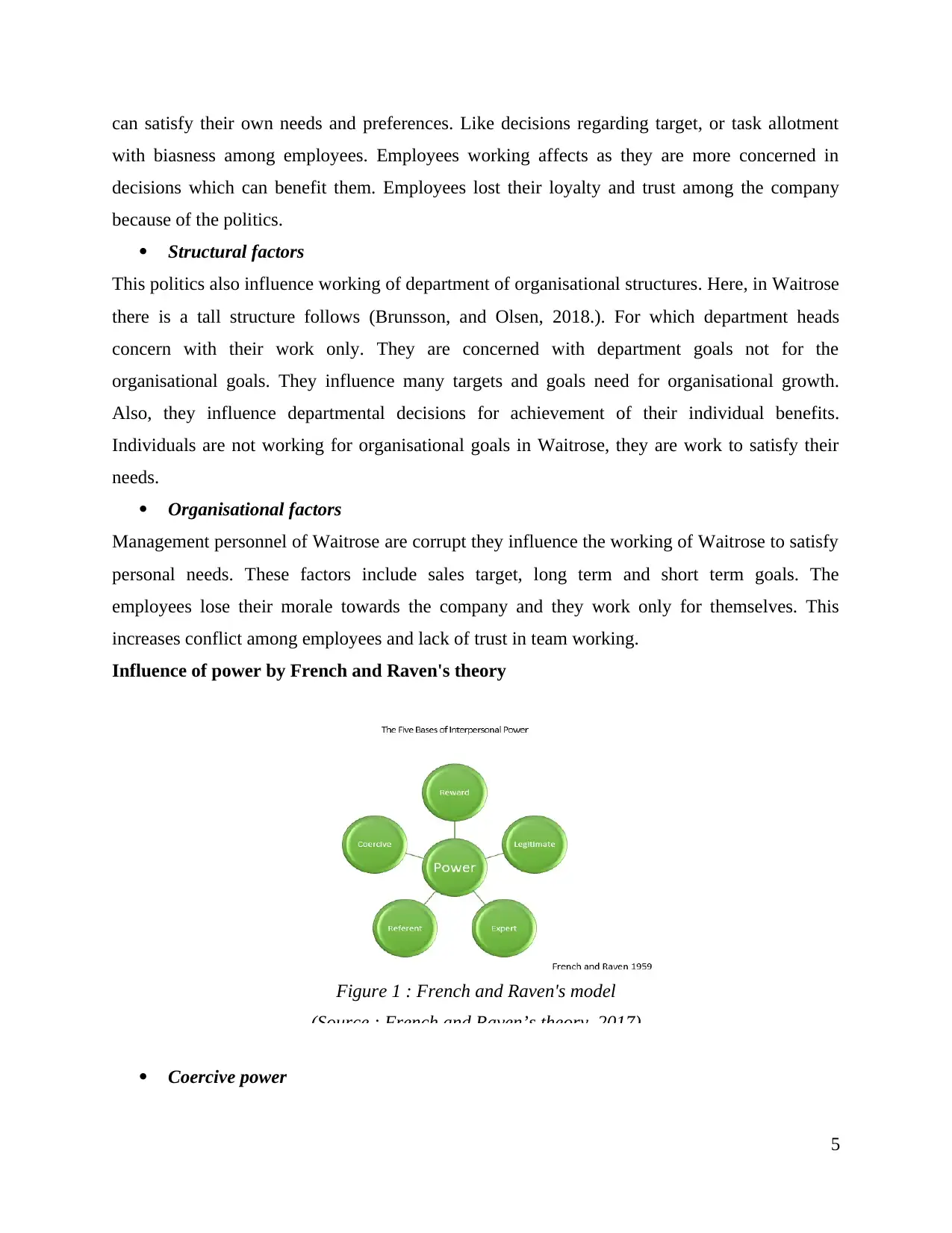
can satisfy their own needs and preferences. Like decisions regarding target, or task allotment
with biasness among employees. Employees working affects as they are more concerned in
decisions which can benefit them. Employees lost their loyalty and trust among the company
because of the politics.
Structural factors
This politics also influence working of department of organisational structures. Here, in Waitrose
there is a tall structure follows (Brunsson, and Olsen, 2018.). For which department heads
concern with their work only. They are concerned with department goals not for the
organisational goals. They influence many targets and goals need for organisational growth.
Also, they influence departmental decisions for achievement of their individual benefits.
Individuals are not working for organisational goals in Waitrose, they are work to satisfy their
needs.
Organisational factors
Management personnel of Waitrose are corrupt they influence the working of Waitrose to satisfy
personal needs. These factors include sales target, long term and short term goals. The
employees lose their morale towards the company and they work only for themselves. This
increases conflict among employees and lack of trust in team working.
Influence of power by French and Raven's theory
Coercive power
5
Figure 1 : French and Raven's model
(Source : French and Raven’s theory, 2017)
with biasness among employees. Employees working affects as they are more concerned in
decisions which can benefit them. Employees lost their loyalty and trust among the company
because of the politics.
Structural factors
This politics also influence working of department of organisational structures. Here, in Waitrose
there is a tall structure follows (Brunsson, and Olsen, 2018.). For which department heads
concern with their work only. They are concerned with department goals not for the
organisational goals. They influence many targets and goals need for organisational growth.
Also, they influence departmental decisions for achievement of their individual benefits.
Individuals are not working for organisational goals in Waitrose, they are work to satisfy their
needs.
Organisational factors
Management personnel of Waitrose are corrupt they influence the working of Waitrose to satisfy
personal needs. These factors include sales target, long term and short term goals. The
employees lose their morale towards the company and they work only for themselves. This
increases conflict among employees and lack of trust in team working.
Influence of power by French and Raven's theory
Coercive power
5
Figure 1 : French and Raven's model
(Source : French and Raven’s theory, 2017)
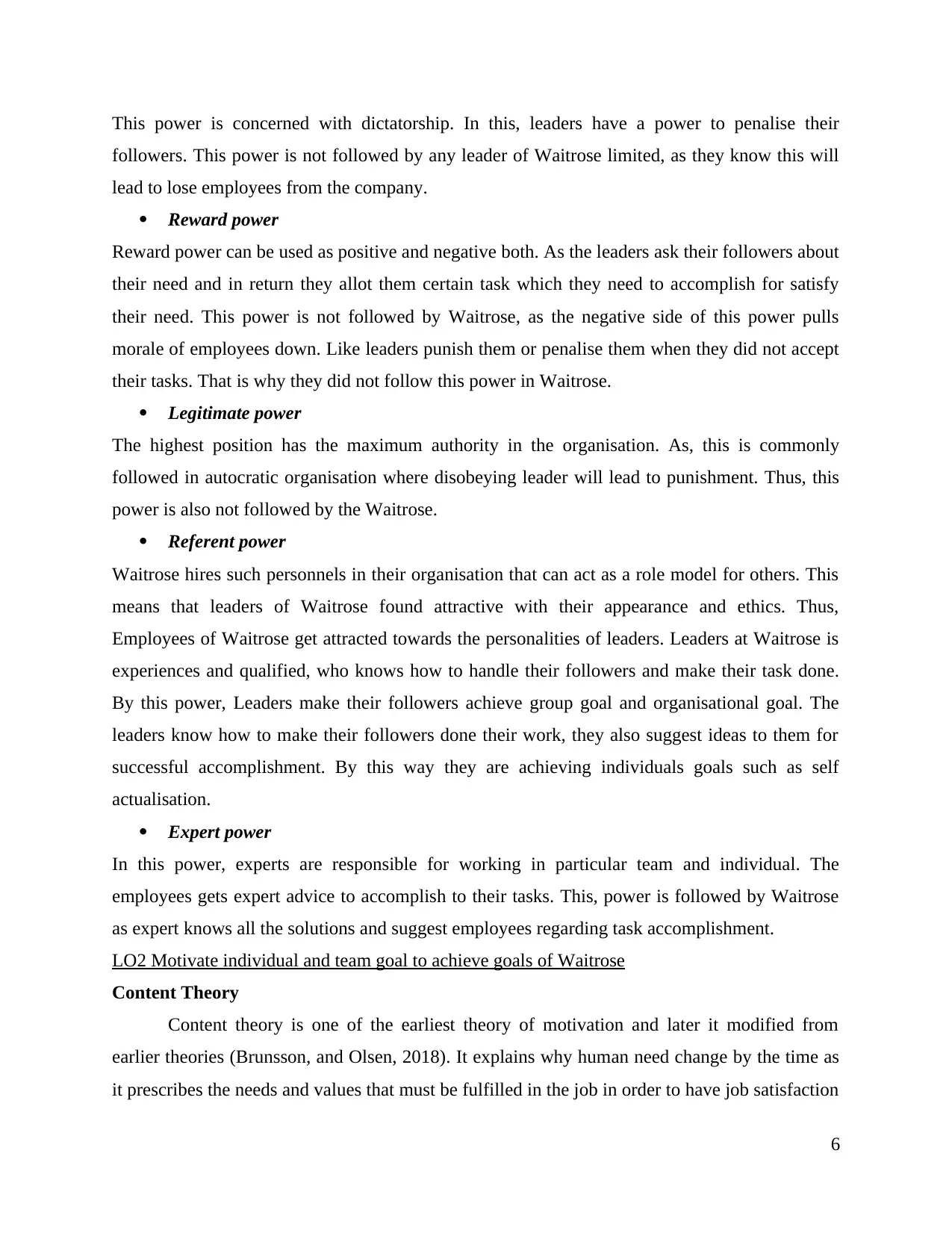
This power is concerned with dictatorship. In this, leaders have a power to penalise their
followers. This power is not followed by any leader of Waitrose limited, as they know this will
lead to lose employees from the company.
Reward power
Reward power can be used as positive and negative both. As the leaders ask their followers about
their need and in return they allot them certain task which they need to accomplish for satisfy
their need. This power is not followed by Waitrose, as the negative side of this power pulls
morale of employees down. Like leaders punish them or penalise them when they did not accept
their tasks. That is why they did not follow this power in Waitrose.
Legitimate power
The highest position has the maximum authority in the organisation. As, this is commonly
followed in autocratic organisation where disobeying leader will lead to punishment. Thus, this
power is also not followed by the Waitrose.
Referent power
Waitrose hires such personnels in their organisation that can act as a role model for others. This
means that leaders of Waitrose found attractive with their appearance and ethics. Thus,
Employees of Waitrose get attracted towards the personalities of leaders. Leaders at Waitrose is
experiences and qualified, who knows how to handle their followers and make their task done.
By this power, Leaders make their followers achieve group goal and organisational goal. The
leaders know how to make their followers done their work, they also suggest ideas to them for
successful accomplishment. By this way they are achieving individuals goals such as self
actualisation.
Expert power
In this power, experts are responsible for working in particular team and individual. The
employees gets expert advice to accomplish to their tasks. This, power is followed by Waitrose
as expert knows all the solutions and suggest employees regarding task accomplishment.
LO2 Motivate individual and team goal to achieve goals of Waitrose
Content Theory
Content theory is one of the earliest theory of motivation and later it modified from
earlier theories (Brunsson, and Olsen, 2018). It explains why human need change by the time as
it prescribes the needs and values that must be fulfilled in the job in order to have job satisfaction
6
followers. This power is not followed by any leader of Waitrose limited, as they know this will
lead to lose employees from the company.
Reward power
Reward power can be used as positive and negative both. As the leaders ask their followers about
their need and in return they allot them certain task which they need to accomplish for satisfy
their need. This power is not followed by Waitrose, as the negative side of this power pulls
morale of employees down. Like leaders punish them or penalise them when they did not accept
their tasks. That is why they did not follow this power in Waitrose.
Legitimate power
The highest position has the maximum authority in the organisation. As, this is commonly
followed in autocratic organisation where disobeying leader will lead to punishment. Thus, this
power is also not followed by the Waitrose.
Referent power
Waitrose hires such personnels in their organisation that can act as a role model for others. This
means that leaders of Waitrose found attractive with their appearance and ethics. Thus,
Employees of Waitrose get attracted towards the personalities of leaders. Leaders at Waitrose is
experiences and qualified, who knows how to handle their followers and make their task done.
By this power, Leaders make their followers achieve group goal and organisational goal. The
leaders know how to make their followers done their work, they also suggest ideas to them for
successful accomplishment. By this way they are achieving individuals goals such as self
actualisation.
Expert power
In this power, experts are responsible for working in particular team and individual. The
employees gets expert advice to accomplish to their tasks. This, power is followed by Waitrose
as expert knows all the solutions and suggest employees regarding task accomplishment.
LO2 Motivate individual and team goal to achieve goals of Waitrose
Content Theory
Content theory is one of the earliest theory of motivation and later it modified from
earlier theories (Brunsson, and Olsen, 2018). It explains why human need change by the time as
it prescribes the needs and values that must be fulfilled in the job in order to have job satisfaction
6
⊘ This is a preview!⊘
Do you want full access?
Subscribe today to unlock all pages.

Trusted by 1+ million students worldwide
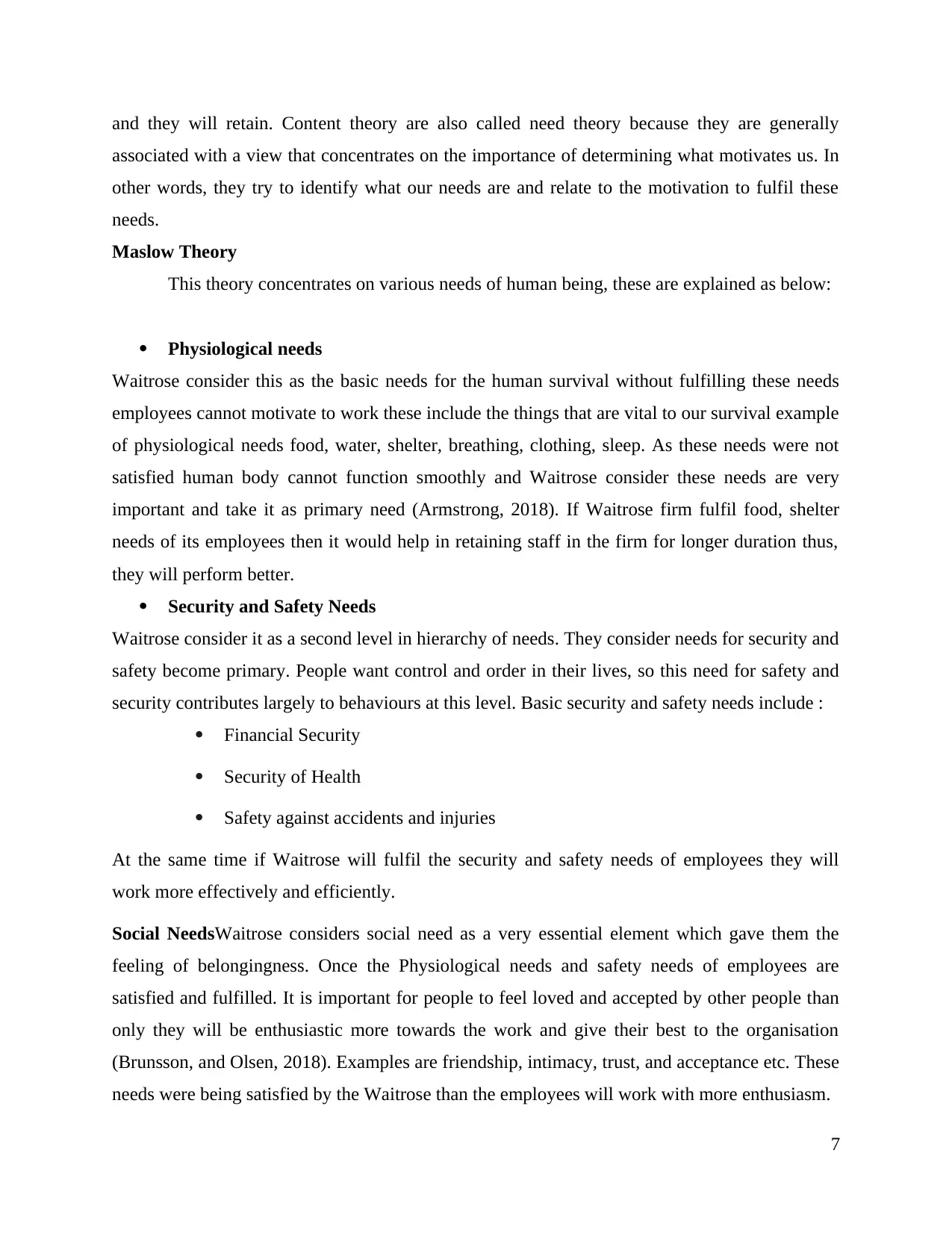
and they will retain. Content theory are also called need theory because they are generally
associated with a view that concentrates on the importance of determining what motivates us. In
other words, they try to identify what our needs are and relate to the motivation to fulfil these
needs.
Maslow Theory
This theory concentrates on various needs of human being, these are explained as below:
Physiological needs
Waitrose consider this as the basic needs for the human survival without fulfilling these needs
employees cannot motivate to work these include the things that are vital to our survival example
of physiological needs food, water, shelter, breathing, clothing, sleep. As these needs were not
satisfied human body cannot function smoothly and Waitrose consider these needs are very
important and take it as primary need (Armstrong, 2018). If Waitrose firm fulfil food, shelter
needs of its employees then it would help in retaining staff in the firm for longer duration thus,
they will perform better.
Security and Safety Needs
Waitrose consider it as a second level in hierarchy of needs. They consider needs for security and
safety become primary. People want control and order in their lives, so this need for safety and
security contributes largely to behaviours at this level. Basic security and safety needs include :
Financial Security
Security of Health
Safety against accidents and injuries
At the same time if Waitrose will fulfil the security and safety needs of employees they will
work more effectively and efficiently.
Social NeedsWaitrose considers social need as a very essential element which gave them the
feeling of belongingness. Once the Physiological needs and safety needs of employees are
satisfied and fulfilled. It is important for people to feel loved and accepted by other people than
only they will be enthusiastic more towards the work and give their best to the organisation
(Brunsson, and Olsen, 2018). Examples are friendship, intimacy, trust, and acceptance etc. These
needs were being satisfied by the Waitrose than the employees will work with more enthusiasm.
7
associated with a view that concentrates on the importance of determining what motivates us. In
other words, they try to identify what our needs are and relate to the motivation to fulfil these
needs.
Maslow Theory
This theory concentrates on various needs of human being, these are explained as below:
Physiological needs
Waitrose consider this as the basic needs for the human survival without fulfilling these needs
employees cannot motivate to work these include the things that are vital to our survival example
of physiological needs food, water, shelter, breathing, clothing, sleep. As these needs were not
satisfied human body cannot function smoothly and Waitrose consider these needs are very
important and take it as primary need (Armstrong, 2018). If Waitrose firm fulfil food, shelter
needs of its employees then it would help in retaining staff in the firm for longer duration thus,
they will perform better.
Security and Safety Needs
Waitrose consider it as a second level in hierarchy of needs. They consider needs for security and
safety become primary. People want control and order in their lives, so this need for safety and
security contributes largely to behaviours at this level. Basic security and safety needs include :
Financial Security
Security of Health
Safety against accidents and injuries
At the same time if Waitrose will fulfil the security and safety needs of employees they will
work more effectively and efficiently.
Social NeedsWaitrose considers social need as a very essential element which gave them the
feeling of belongingness. Once the Physiological needs and safety needs of employees are
satisfied and fulfilled. It is important for people to feel loved and accepted by other people than
only they will be enthusiastic more towards the work and give their best to the organisation
(Brunsson, and Olsen, 2018). Examples are friendship, intimacy, trust, and acceptance etc. These
needs were being satisfied by the Waitrose than the employees will work with more enthusiasm.
7
Paraphrase This Document
Need a fresh take? Get an instant paraphrase of this document with our AI Paraphraser
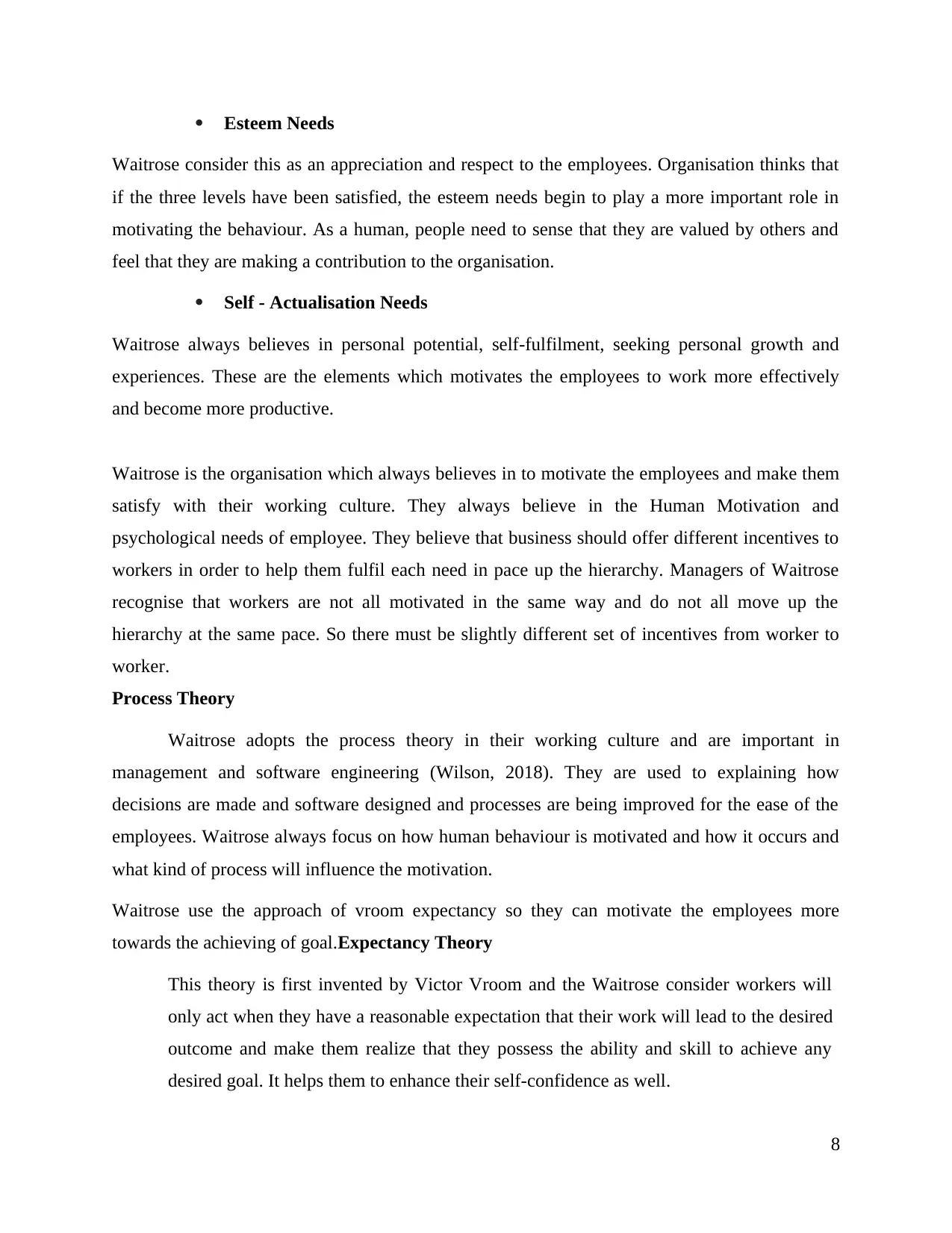
Esteem Needs
Waitrose consider this as an appreciation and respect to the employees. Organisation thinks that
if the three levels have been satisfied, the esteem needs begin to play a more important role in
motivating the behaviour. As a human, people need to sense that they are valued by others and
feel that they are making a contribution to the organisation.
Self - Actualisation Needs
Waitrose always believes in personal potential, self-fulfilment, seeking personal growth and
experiences. These are the elements which motivates the employees to work more effectively
and become more productive.
Waitrose is the organisation which always believes in to motivate the employees and make them
satisfy with their working culture. They always believe in the Human Motivation and
psychological needs of employee. They believe that business should offer different incentives to
workers in order to help them fulfil each need in pace up the hierarchy. Managers of Waitrose
recognise that workers are not all motivated in the same way and do not all move up the
hierarchy at the same pace. So there must be slightly different set of incentives from worker to
worker.
Process Theory
Waitrose adopts the process theory in their working culture and are important in
management and software engineering (Wilson, 2018). They are used to explaining how
decisions are made and software designed and processes are being improved for the ease of the
employees. Waitrose always focus on how human behaviour is motivated and how it occurs and
what kind of process will influence the motivation.
Waitrose use the approach of vroom expectancy so they can motivate the employees more
towards the achieving of goal.Expectancy Theory
This theory is first invented by Victor Vroom and the Waitrose consider workers will
only act when they have a reasonable expectation that their work will lead to the desired
outcome and make them realize that they possess the ability and skill to achieve any
desired goal. It helps them to enhance their self-confidence as well.
8
Waitrose consider this as an appreciation and respect to the employees. Organisation thinks that
if the three levels have been satisfied, the esteem needs begin to play a more important role in
motivating the behaviour. As a human, people need to sense that they are valued by others and
feel that they are making a contribution to the organisation.
Self - Actualisation Needs
Waitrose always believes in personal potential, self-fulfilment, seeking personal growth and
experiences. These are the elements which motivates the employees to work more effectively
and become more productive.
Waitrose is the organisation which always believes in to motivate the employees and make them
satisfy with their working culture. They always believe in the Human Motivation and
psychological needs of employee. They believe that business should offer different incentives to
workers in order to help them fulfil each need in pace up the hierarchy. Managers of Waitrose
recognise that workers are not all motivated in the same way and do not all move up the
hierarchy at the same pace. So there must be slightly different set of incentives from worker to
worker.
Process Theory
Waitrose adopts the process theory in their working culture and are important in
management and software engineering (Wilson, 2018). They are used to explaining how
decisions are made and software designed and processes are being improved for the ease of the
employees. Waitrose always focus on how human behaviour is motivated and how it occurs and
what kind of process will influence the motivation.
Waitrose use the approach of vroom expectancy so they can motivate the employees more
towards the achieving of goal.Expectancy Theory
This theory is first invented by Victor Vroom and the Waitrose consider workers will
only act when they have a reasonable expectation that their work will lead to the desired
outcome and make them realize that they possess the ability and skill to achieve any
desired goal. It helps them to enhance their self-confidence as well.
8
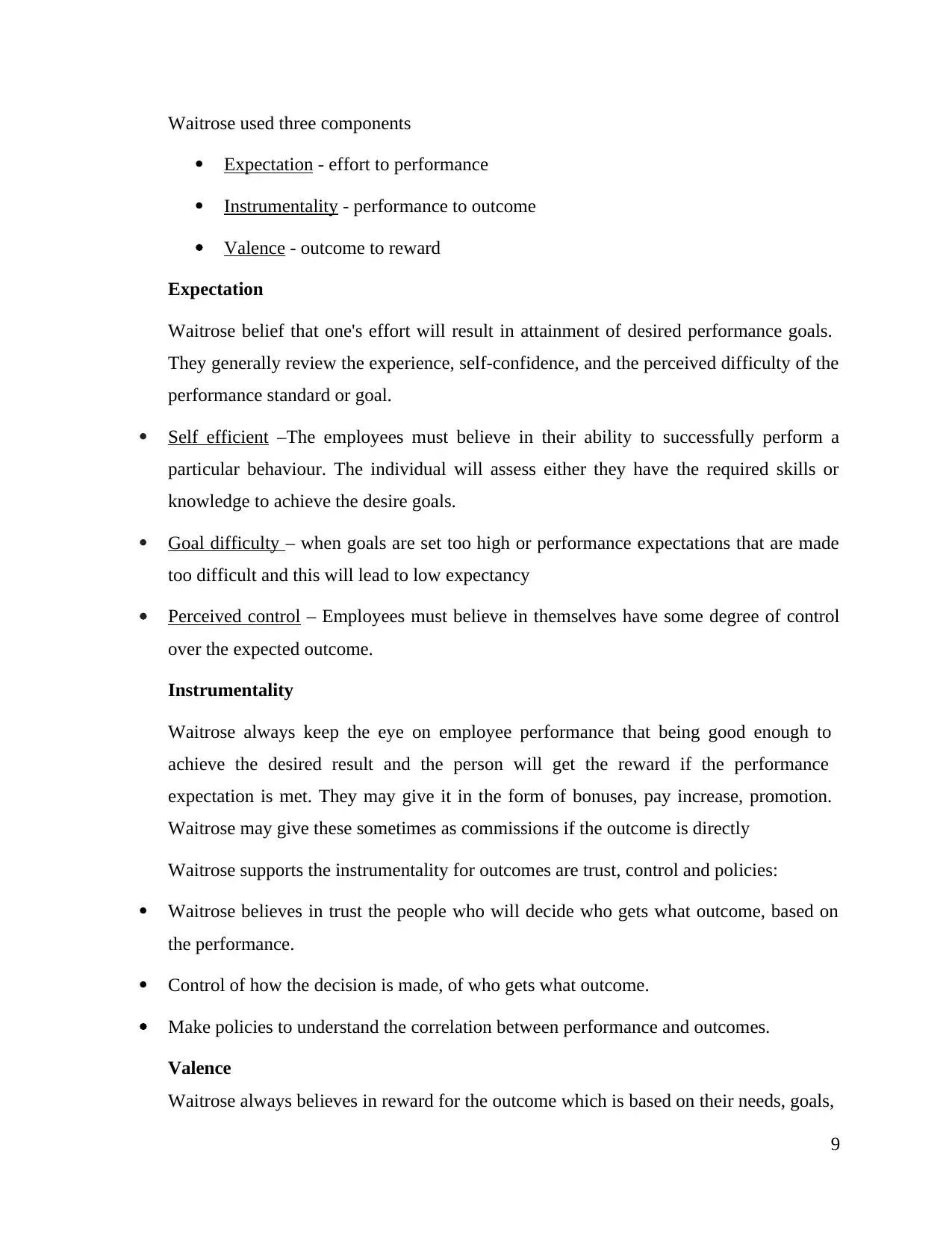
Waitrose used three components
Expectation - effort to performance
Instrumentality - performance to outcome
Valence - outcome to reward
Expectation
Waitrose belief that one's effort will result in attainment of desired performance goals.
They generally review the experience, self-confidence, and the perceived difficulty of the
performance standard or goal.
Self efficient –The employees must believe in their ability to successfully perform a
particular behaviour. The individual will assess either they have the required skills or
knowledge to achieve the desire goals.
Goal difficulty – when goals are set too high or performance expectations that are made
too difficult and this will lead to low expectancy
Perceived control – Employees must believe in themselves have some degree of control
over the expected outcome.
Instrumentality
Waitrose always keep the eye on employee performance that being good enough to
achieve the desired result and the person will get the reward if the performance
expectation is met. They may give it in the form of bonuses, pay increase, promotion.
Waitrose may give these sometimes as commissions if the outcome is directly
Waitrose supports the instrumentality for outcomes are trust, control and policies:
Waitrose believes in trust the people who will decide who gets what outcome, based on
the performance.
Control of how the decision is made, of who gets what outcome.
Make policies to understand the correlation between performance and outcomes.
Valence
Waitrose always believes in reward for the outcome which is based on their needs, goals,
9
Expectation - effort to performance
Instrumentality - performance to outcome
Valence - outcome to reward
Expectation
Waitrose belief that one's effort will result in attainment of desired performance goals.
They generally review the experience, self-confidence, and the perceived difficulty of the
performance standard or goal.
Self efficient –The employees must believe in their ability to successfully perform a
particular behaviour. The individual will assess either they have the required skills or
knowledge to achieve the desire goals.
Goal difficulty – when goals are set too high or performance expectations that are made
too difficult and this will lead to low expectancy
Perceived control – Employees must believe in themselves have some degree of control
over the expected outcome.
Instrumentality
Waitrose always keep the eye on employee performance that being good enough to
achieve the desired result and the person will get the reward if the performance
expectation is met. They may give it in the form of bonuses, pay increase, promotion.
Waitrose may give these sometimes as commissions if the outcome is directly
Waitrose supports the instrumentality for outcomes are trust, control and policies:
Waitrose believes in trust the people who will decide who gets what outcome, based on
the performance.
Control of how the decision is made, of who gets what outcome.
Make policies to understand the correlation between performance and outcomes.
Valence
Waitrose always believes in reward for the outcome which is based on their needs, goals,
9
⊘ This is a preview!⊘
Do you want full access?
Subscribe today to unlock all pages.

Trusted by 1+ million students worldwide
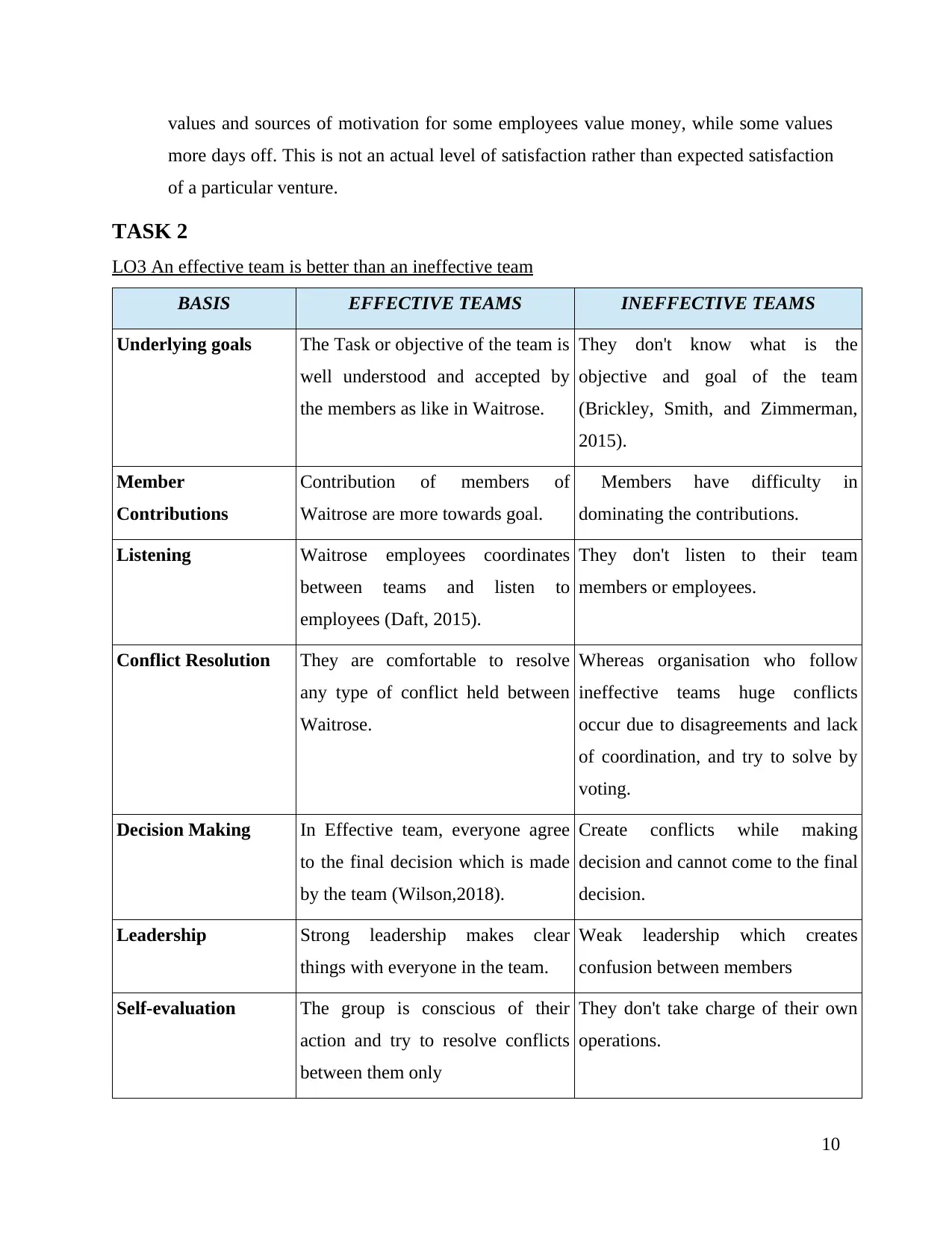
values and sources of motivation for some employees value money, while some values
more days off. This is not an actual level of satisfaction rather than expected satisfaction
of a particular venture.
TASK 2
LO3 An effective team is better than an ineffective team
BASIS EFFECTIVE TEAMS INEFFECTIVE TEAMS
Underlying goals The Task or objective of the team is
well understood and accepted by
the members as like in Waitrose.
They don't know what is the
objective and goal of the team
(Brickley, Smith, and Zimmerman,
2015).
Member
Contributions
Contribution of members of
Waitrose are more towards goal.
Members have difficulty in
dominating the contributions.
Listening Waitrose employees coordinates
between teams and listen to
employees (Daft, 2015).
They don't listen to their team
members or employees.
Conflict Resolution They are comfortable to resolve
any type of conflict held between
Waitrose.
Whereas organisation who follow
ineffective teams huge conflicts
occur due to disagreements and lack
of coordination, and try to solve by
voting.
Decision Making In Effective team, everyone agree
to the final decision which is made
by the team (Wilson,2018).
Create conflicts while making
decision and cannot come to the final
decision.
Leadership Strong leadership makes clear
things with everyone in the team.
Weak leadership which creates
confusion between members
Self-evaluation The group is conscious of their
action and try to resolve conflicts
between them only
They don't take charge of their own
operations.
10
more days off. This is not an actual level of satisfaction rather than expected satisfaction
of a particular venture.
TASK 2
LO3 An effective team is better than an ineffective team
BASIS EFFECTIVE TEAMS INEFFECTIVE TEAMS
Underlying goals The Task or objective of the team is
well understood and accepted by
the members as like in Waitrose.
They don't know what is the
objective and goal of the team
(Brickley, Smith, and Zimmerman,
2015).
Member
Contributions
Contribution of members of
Waitrose are more towards goal.
Members have difficulty in
dominating the contributions.
Listening Waitrose employees coordinates
between teams and listen to
employees (Daft, 2015).
They don't listen to their team
members or employees.
Conflict Resolution They are comfortable to resolve
any type of conflict held between
Waitrose.
Whereas organisation who follow
ineffective teams huge conflicts
occur due to disagreements and lack
of coordination, and try to solve by
voting.
Decision Making In Effective team, everyone agree
to the final decision which is made
by the team (Wilson,2018).
Create conflicts while making
decision and cannot come to the final
decision.
Leadership Strong leadership makes clear
things with everyone in the team.
Weak leadership which creates
confusion between members
Self-evaluation The group is conscious of their
action and try to resolve conflicts
between them only
They don't take charge of their own
operations.
10
Paraphrase This Document
Need a fresh take? Get an instant paraphrase of this document with our AI Paraphraser
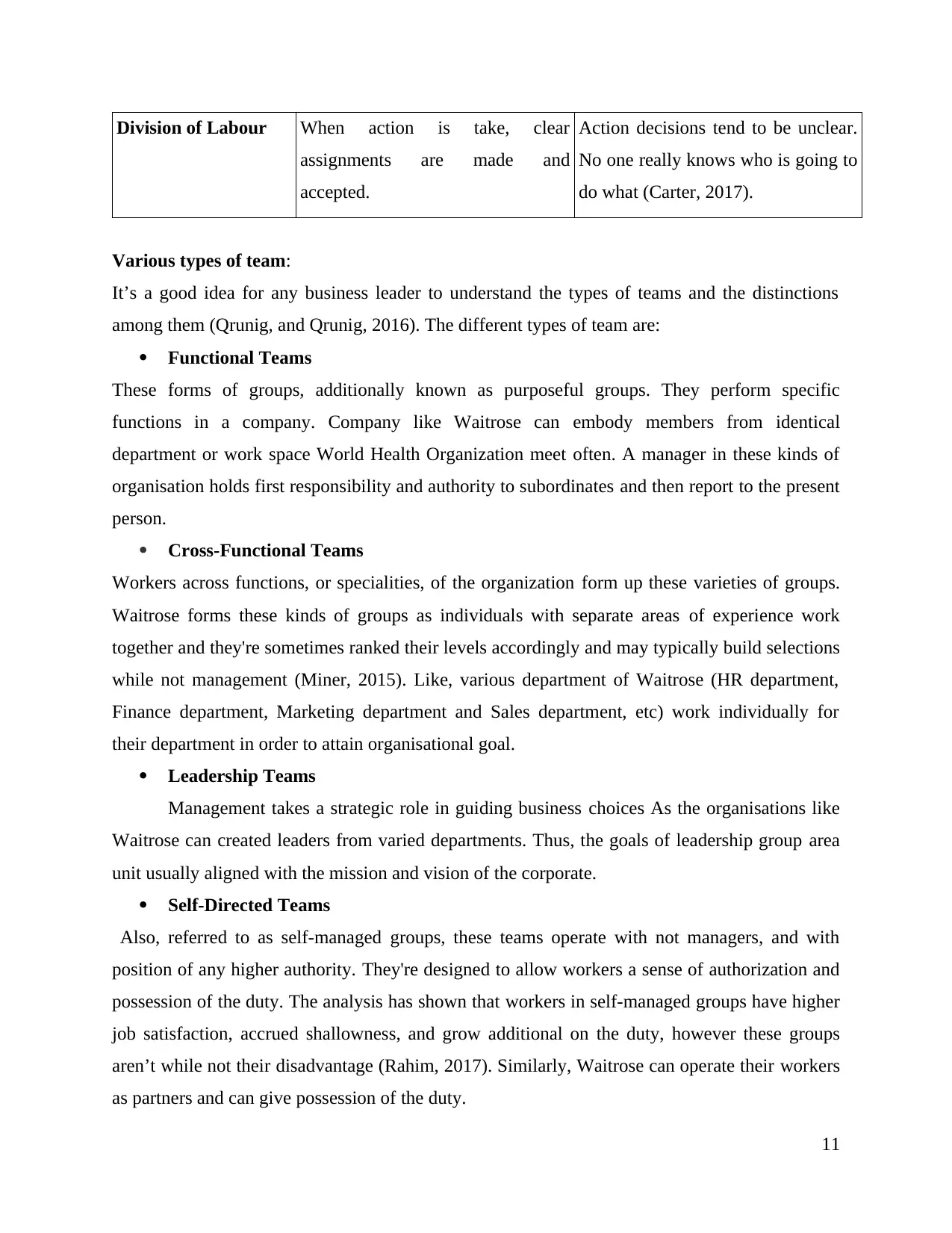
Division of Labour When action is take, clear
assignments are made and
accepted.
Action decisions tend to be unclear.
No one really knows who is going to
do what (Carter, 2017).
Various types of team:
It’s a good idea for any business leader to understand the types of teams and the distinctions
among them (Qrunig, and Qrunig, 2016). The different types of team are:
Functional Teams
These forms of groups, additionally known as purposeful groups. They perform specific
functions in a company. Company like Waitrose can embody members from identical
department or work space World Health Organization meet often. A manager in these kinds of
organisation holds first responsibility and authority to subordinates and then report to the present
person.
Cross-Functional Teams
Workers across functions, or specialities, of the organization form up these varieties of groups.
Waitrose forms these kinds of groups as individuals with separate areas of experience work
together and they're sometimes ranked their levels accordingly and may typically build selections
while not management (Miner, 2015). Like, various department of Waitrose (HR department,
Finance department, Marketing department and Sales department, etc) work individually for
their department in order to attain organisational goal.
Leadership Teams
Management takes a strategic role in guiding business choices As the organisations like
Waitrose can created leaders from varied departments. Thus, the goals of leadership group area
unit usually aligned with the mission and vision of the corporate.
Self-Directed Teams
Also, referred to as self-managed groups, these teams operate with not managers, and with
position of any higher authority. They're designed to allow workers a sense of authorization and
possession of the duty. The analysis has shown that workers in self-managed groups have higher
job satisfaction, accrued shallowness, and grow additional on the duty, however these groups
aren’t while not their disadvantage (Rahim, 2017). Similarly, Waitrose can operate their workers
as partners and can give possession of the duty.
11
assignments are made and
accepted.
Action decisions tend to be unclear.
No one really knows who is going to
do what (Carter, 2017).
Various types of team:
It’s a good idea for any business leader to understand the types of teams and the distinctions
among them (Qrunig, and Qrunig, 2016). The different types of team are:
Functional Teams
These forms of groups, additionally known as purposeful groups. They perform specific
functions in a company. Company like Waitrose can embody members from identical
department or work space World Health Organization meet often. A manager in these kinds of
organisation holds first responsibility and authority to subordinates and then report to the present
person.
Cross-Functional Teams
Workers across functions, or specialities, of the organization form up these varieties of groups.
Waitrose forms these kinds of groups as individuals with separate areas of experience work
together and they're sometimes ranked their levels accordingly and may typically build selections
while not management (Miner, 2015). Like, various department of Waitrose (HR department,
Finance department, Marketing department and Sales department, etc) work individually for
their department in order to attain organisational goal.
Leadership Teams
Management takes a strategic role in guiding business choices As the organisations like
Waitrose can created leaders from varied departments. Thus, the goals of leadership group area
unit usually aligned with the mission and vision of the corporate.
Self-Directed Teams
Also, referred to as self-managed groups, these teams operate with not managers, and with
position of any higher authority. They're designed to allow workers a sense of authorization and
possession of the duty. The analysis has shown that workers in self-managed groups have higher
job satisfaction, accrued shallowness, and grow additional on the duty, however these groups
aren’t while not their disadvantage (Rahim, 2017). Similarly, Waitrose can operate their workers
as partners and can give possession of the duty.
11
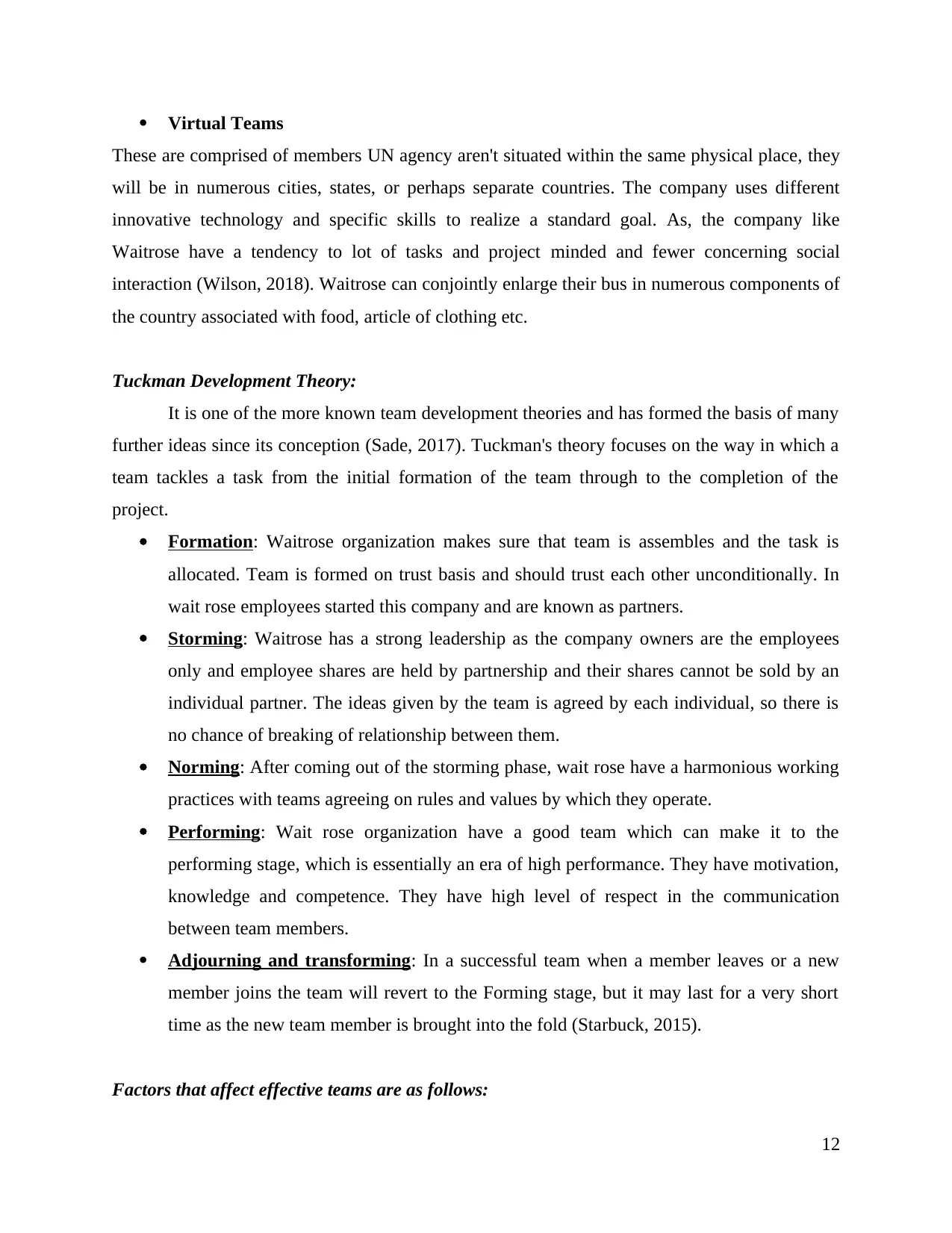
Virtual Teams
These are comprised of members UN agency aren't situated within the same physical place, they
will be in numerous cities, states, or perhaps separate countries. The company uses different
innovative technology and specific skills to realize a standard goal. As, the company like
Waitrose have a tendency to lot of tasks and project minded and fewer concerning social
interaction (Wilson, 2018). Waitrose can conjointly enlarge their bus in numerous components of
the country associated with food, article of clothing etc.
Tuckman Development Theory:
It is one of the more known team development theories and has formed the basis of many
further ideas since its conception (Sade, 2017). Tuckman's theory focuses on the way in which a
team tackles a task from the initial formation of the team through to the completion of the
project.
Formation: Waitrose organization makes sure that team is assembles and the task is
allocated. Team is formed on trust basis and should trust each other unconditionally. In
wait rose employees started this company and are known as partners.
Storming: Waitrose has a strong leadership as the company owners are the employees
only and employee shares are held by partnership and their shares cannot be sold by an
individual partner. The ideas given by the team is agreed by each individual, so there is
no chance of breaking of relationship between them.
Norming: After coming out of the storming phase, wait rose have a harmonious working
practices with teams agreeing on rules and values by which they operate.
Performing: Wait rose organization have a good team which can make it to the
performing stage, which is essentially an era of high performance. They have motivation,
knowledge and competence. They have high level of respect in the communication
between team members.
Adjourning and transforming: In a successful team when a member leaves or a new
member joins the team will revert to the Forming stage, but it may last for a very short
time as the new team member is brought into the fold (Starbuck, 2015).
Factors that affect effective teams are as follows:
12
These are comprised of members UN agency aren't situated within the same physical place, they
will be in numerous cities, states, or perhaps separate countries. The company uses different
innovative technology and specific skills to realize a standard goal. As, the company like
Waitrose have a tendency to lot of tasks and project minded and fewer concerning social
interaction (Wilson, 2018). Waitrose can conjointly enlarge their bus in numerous components of
the country associated with food, article of clothing etc.
Tuckman Development Theory:
It is one of the more known team development theories and has formed the basis of many
further ideas since its conception (Sade, 2017). Tuckman's theory focuses on the way in which a
team tackles a task from the initial formation of the team through to the completion of the
project.
Formation: Waitrose organization makes sure that team is assembles and the task is
allocated. Team is formed on trust basis and should trust each other unconditionally. In
wait rose employees started this company and are known as partners.
Storming: Waitrose has a strong leadership as the company owners are the employees
only and employee shares are held by partnership and their shares cannot be sold by an
individual partner. The ideas given by the team is agreed by each individual, so there is
no chance of breaking of relationship between them.
Norming: After coming out of the storming phase, wait rose have a harmonious working
practices with teams agreeing on rules and values by which they operate.
Performing: Wait rose organization have a good team which can make it to the
performing stage, which is essentially an era of high performance. They have motivation,
knowledge and competence. They have high level of respect in the communication
between team members.
Adjourning and transforming: In a successful team when a member leaves or a new
member joins the team will revert to the Forming stage, but it may last for a very short
time as the new team member is brought into the fold (Starbuck, 2015).
Factors that affect effective teams are as follows:
12
⊘ This is a preview!⊘
Do you want full access?
Subscribe today to unlock all pages.

Trusted by 1+ million students worldwide
1 out of 17
Related Documents
Your All-in-One AI-Powered Toolkit for Academic Success.
+13062052269
info@desklib.com
Available 24*7 on WhatsApp / Email
![[object Object]](/_next/static/media/star-bottom.7253800d.svg)
Unlock your academic potential
Copyright © 2020–2026 A2Z Services. All Rights Reserved. Developed and managed by ZUCOL.





